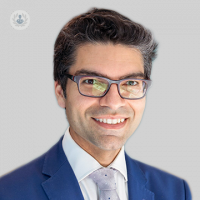COVID-19 with obesity: what are the dangers?
Written by:Recent research shows that obese people are at a higher risk of severe illness with COVID-19. One of our specialist bariatric surgeons Mr Ahmed R. Ahmed has witnessed overweight people being hit hard by the virus firsthand.
Rather than continuing with his patients’ weight loss surgeries during the pandemic, Mr Ahmed has been working in an intensive care unit (ICU) in London to help out at the peak of the crisis.
Here, Mr Ahmed explains the importance of reducing BMI by just five points in obese patients in order to dramatically improve outcomes should they contract coronavirus.

What is the link between obesity and coronavirus?
Since age, gender and ethnicity are not modifiable, obesity is emerging as the one risk factor that we can treat to reduce the risk of significant COVID-19 illness and death. Nobody to date has yet worked out the precise causal mechanism but it would appear that coronavirus seems to attack the respiratory system of obese people much more severely.
Obesity carries complications anyway but with COVID-19 my own hypothesis is that there is definitely a link with poorer outcomes. There are more cases of severe lung disease and therefore a higher and substantial risk of needing a ventilator.
How does COVID-19 affect an obese person?
My theory is that people are suffering from COVID-19 because their immune systems are overreacting. We’ve known for decades that obesity is a pro-inflammatory condition.
It may well be that obese people are worse off when they get COVID-19 as they already have an element of an inflammatory state because of their obesity. Their body’s immune system is in overdrive and basically decimating their lungs.
On that basis as well, they already have poor lung function and then getting the stress of the COVID-19 on top of that, basically tips them over the edge.
Can obesity-related diseases be reversed?
People that are obese will have higher rates of organ disease overall. Typically, obesity attacks the lungs but also the heart, kidneys, liver and pancreas because of the link to diabetes.
The amazing thing is, however, is that if you treat obesity, almost all of these conditions are reversible or you can definitely make a big dent and improve the condition.
How can obese patients reduce their risk of a poor outcome with coronavirus?
For most people with a BMI of 30 or more, losing just five BMI points could slash their risk from coronavirus dramatically.
They don’t need to lose a massive amount of weight but from the studies that I’ve looked at – and if we assume that COVID-19 doubles your risk of a poor outcome if you’re obese – most people just need to reduce their BMI by approximately five points.
For the average height person that is roughly about two stone, which might be enough to cause a 50% risk reduction of a poor outcome from COVID-19. That is rough mathematics but taking those assumptions onboard, it’s only a small weight loss for a big outcome.
Weight loss surgery should also be prioritised more because if we reduce obesity in the UK, the risks from coronavirus could also potentially be reduced.
If you would like to discuss your weight loss surgery options, do not hesitate to book an appointment with Mr Ahmed now via his Top Doctor’s profile here.


